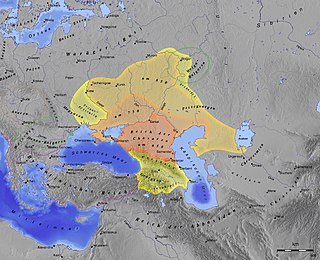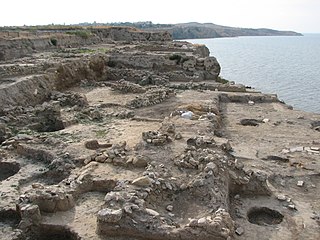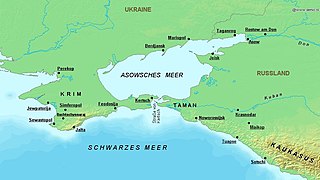
The Khazars were a semi-nomadic Turkic people with a confederation of Turkic-speaking tribes that in the late 6th century CE established a major commercial empire covering the southeastern section of modern European Russia, southern Ukraine, Crimea and Kazakhstan. The Caspian Sea is still called the Khazar Sea in some local languages such as Azerbaijani (Khazar-deniz). The Khazars created what for its duration was the most powerful polity to emerge from the break-up of the Western Turkic Khaganate. Astride a major artery of commerce between Eastern Europe and Southwestern Asia, Khazaria became one of the foremost trading empires of the medieval world, commanding the western marches of the Silk Road and playing a key commercial role as a crossroad between China, the Middle East and Kievan Rus'. For some three centuries the Khazars dominated the vast area extending from the Volga-Don steppes to the eastern Crimea and the northern Caucasus.

The Volga is the longest river in Europe. Flowing through Central Russia to Southern Russia and into the Caspian Sea, it has a length of 3,531 km (2,194 mi) and a catchment area of 1,360,000 km2 (530,000 sq mi). It is also Europe's largest river in terms of discharge and drainage basin. It is widely regarded as the national river of Russia. The old Russian state, the Rus' Khaganate, arose around the Volga river. Historically, it was an important meeting place of Eurasian civilizations.
Grand Prince of Kiev was the title of the prince of Kiev (Kyiv) and the ruler of Kievan Rus' from the 10th to 13th centuries. In the 13th century, Kiev became an appanage principality first of the Grand Prince of Vladimir and the Golden Horde governors, and later was taken over by the Grand Duchy of Lithuania.
Volga Bulgaria or Volga–Kama Bulghar, was a historic Bulgar state that existed between the 7th and 13th centuries around the confluence of the Volga and Kama River, in what is now European Russia. Volga Bulgaria was a multi-ethnic state with large numbers of Turkic Bulgars, a variety of Finnic and Ugric peoples, and many East Slavs. The very strategic position of Volga Bulgaria allowed it to create a monopoly between the trade of Arabs, Norse and Avars.

The Khanate of Kazan was a medieval Tatar Turkic state that occupied the territory of former Volga Bulgaria between 1438 and 1552. The khanate covered contemporary Tatarstan, Mari El, Chuvashia, Mordovia, and parts of Udmurtia and Bashkortostan; its capital was the city of Kazan. It was one of the successor states of the Golden Horde, and it came to an end when it was conquered by the Tsardom of Russia.

Idel-Ural, literally Volga-Ural, is a historical region in Eastern Europe, in what is today Russia. The name literally means Volga-Urals in the Tatar language. The frequently used Russian variant is Volgo-Uralye. The term Idel-Ural is often used to designate 6 republics of Russia of this region: Bashkortostan, Chuvashia, Mari El, Mordovia, Tatarstan and Udmurtia, especially in Tatar-language literature or in the context of minority languages.

The Khanate of Astrakhan, also referred to as the Xacitarxan Khanate, was a Tatar state that arose during the break-up of the Golden Horde. The Khanate existed in the 15th and 16th centuries in the area adjacent to the mouth of the Volga river, around the modern city of Astrakhan. Its khans claimed patrilineal descent from Toqa Temür, the thirteenth son of Jochi and grandson of Genghis Khan.

Tmutarakan was a medieval Kievan Rus' principality and trading town that controlled the Cimmerian Bosporus, the passage from the Black Sea to the Sea of Azov, between the late 10th and 11th centuries. Its site was the ancient Greek colony of Hermonassa founded in the mid 6th century BCE, by Mytilene (Lesbos), situated on the Taman peninsula, in the present-day Krasnodar Krai of Russia, roughly opposite Kerch. The Khazar fortress of Tamantarkhan was built on the site in the 7th century, and became known as Tmutarakan when it came under Kievan Rus control.
Almış iltäbär was the first Muslim ruler (emir) of Volga Bulgaria.

The Taman Peninsula is a peninsula in the present-day Krasnodar Krai of Russia, which borders the Sea of Azov to the North, the Strait of Kerch to the West and the Black Sea to the South.
The Volga Tatars are a Turkic ethnic group native to the Volga-Ural region of Russia. They are subdivided into various subgroups. Volga Tatars are Russia's second-largest ethnicity after the Russians. They compose 53% of the population of Tatarstan and 25% of the population of Bashkortostan.
Turkic migration refers to the spread of Turkic tribes and Turkic languages across Eurasia and between the 6th and 11th centuries. In the 6th century, the Göktürks overthrew the Rouran Khaganate in what is now Mongolia and expanded in all directions, spreading Turkic culture throughout the Eurasian steppes. Although Göktürk empires came to an end in the 8th century, they were succeeded by numerous Turkic empires such as the Uyghur Khaganate, Kara-Khanid Khanate, Khazars, and the Cumans. Some Turks eventually settled down into a sedentary society such as the Qocho and Ganzhou Uyghurs. The Seljuq dynasty settled in Anatolia starting in the 11th century, resulting in permanent Turkic settlement and presence there. Modern nations with large Turkic populations include Kyrgyzstan, Turkmenistan, Uzbekistan and Kazakhstan, and Turkic populations also exist within other nations, such as Chuvashia, Bashkortostan, Tatarstan, the Crimean Tatars, the Uyghurs in China, and the Sakha Republic Siberia.

Irbis was according to a number of Russian sources the founder of the Khazar Khaganate. The Khazars traced their origin to the Turkic Ashina clan in modern Mongolia.
Shad was a state office in the early Central Asian Turkic states, roughly equivalent to governor. "Shad" could only be an appointee over a vassal tribe, where he represented interests of the preeminent Kagan. The name of this tribe was included in his title. For example, Tardu-shad could only be a Shad over Tardu tribe. The title carried autonomy in different degrees, and its links with the central authority of kagan varied from economical and political subordination to superficial political deference. The title Shad is borrowed from an Iranian source.

The Rus' Khaganate, also Russkiy Kaganate is the name applied by some modern historians to a hypothetical polity postulated to have existed during a poorly documented period in the history of Eastern Europe, roughly the late 8th century and early-to-mid-9th-century, AD.

Islam in Tatarstan had existed prior to the tenth century, but it began its major growth in 922, when Bulgar ruler Almış converted to Islam. This was followed by an increase in missionary activity in Volga Bulgaria. Islam remained the dominant religion through the Mongol invasion and subsequent Khanate of Kazan. The region was finally conquered by Russia in 1552, which brought the Tatars and Bashkirs on the Middle Volga into the tsardom. Under Russian rule, Islam was suppressed for many years, first during the Tsardom and Empire and later during the Soviet era. Today, Islam is a major faith in Tatarstan, adhered to by to 53 percent of the estimated 3.8 million population, making it the largest religion.
Astrakhan Tatars are a subgroup of the Volga Tatar.

Old Great Bulgaria or Great Bulgaria, also often known by the Latin names Magna Bulgaria and Patria Onoguria, was a 7th-century Nomadic empire formed by the Onogur Bulgars on the western Pontic–Caspian steppe. Great Bulgaria was originally centered between the Dniester and lower Volga.

Bars Kazan is a Russian professional ice hockey team from Kazan, who compete in the Supreme Hockey League (VHL). The club is affiliated as a feeder club for the Ak Bars Kazan organization of the Kontinental Hockey League (KHL).











